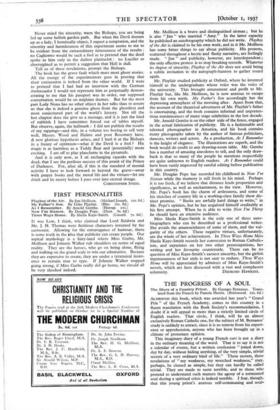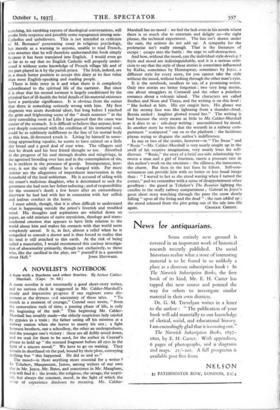THE PROGRESS OF A SOUL
The Diary of a Country Priest. By Georges Bernanos. Trans- lated from the French by Pamela Morris. (Boriswood. ios. 6d.)
ALTHOUGH this book, which was awarded last year's " Grand Prix " of the French Academy, comes to this country in a fluent translation with the Book Society's recommendation, I doubt if it will appeal to more than a strictly limited circle of English readers. That circle, I think, will be an almost exclusively Roman Catholic one, for the subject of M. Bernanos' study is unlikely to attract, since it is so remote from his experi- - ence or apprehension, anyone who has been brought up in a climate of protestant opinion.
This imaginary diary of a young French .cure is not a diary in the ordinary meaning of the word. That is to say it is not a calendar of events, but a written confession " jotted down, day by day, without hiding anything, of the very simple, trivial secrets of a very ordinary kind of life." These secrets, these revelations of " my weakness, my wretched weakness," may, perhaps, be classed as simple, but they can hardly be called trivial. They are made to seem terrible, and to those who pretend to understand such matters the agony of a tormented soul during a spiritual crisis is indeed terrible. I fear, though, that this young priest's anxious self-communing and soul-. searching, his rambling reports of theological conversations, will awake little response and pOssibly some repugnance among non- Catholics and unbelievers. This is not intended as criticism of M. Bernanos' penetrating essay in religious psychology, but merely as a warning to anyone, unable to read French, who assumes that he will therefore understand this. book simply because it has been translated into English. I would even• go so far as to say that no English Catholic will properly under- stand it without some knowledge of French village life and of the part played in it by the parish priest. The Irish, indeed, are in a Much better position to accept this diary at its face value than most Eneish-speaking and reading people.
There is little -story in it and what, there is is completely subordinated to the spiritual life of the narrator. But since it is clear that his mental torment is largely conditioned by the physical fact of ill-health the brief details of his material existence have a particular significance. ,it is obvious from the outset that there is something seriously wrong with him. My first diagnosis was acute duodenal ulcer, but long before I reached the grim and frightening scene of the " death sentence in the dirty consulting room atLille I had guessed fliat the cause was cancer of the stomach. It is difficult to believe that anyone, how- ever deeply concerned with the condition of his immortal soul, could be as sublimely indifferent to'the fate of his mortal body as this lean, ill-favoured youth is. Living by himself in some- thing approaching squalor, he seems to have existed on a little dry bread and a good deal of sour wine. The villagers said that he drank and his best friend thought so too. Absorbed in the progress of his soul through doubts and misgivings, in the agonised brooding over lust and in the contemplation of sin, he is reckless in the presence of gossip. Intemperance, how- ever, is not the only offence he is charged with. Far more sinister are the allegations of impertinent intervention in the household of the local nobleman. He is accused of siding with the count's malicious daughter, who is determined to sack the governess she had seen her father seducing; and of responsibility for the countess's death a few hours after an extraordinary interview he had had with her in connexion with her selfish and jealous conduct in the home.
I must admit, though, that it is often difficult to understand what is happening outside the priest's feverish and troubled mind. His thoughts and aspirations are whirled down on paper, an odd mixture of naive mysticism, theology and trans- cendental emotion . that appears to have little relation to the world about him and 'makes his contacts with that world seem completely unreal. It is, in fact, almost a relief when he is compelled to consult a doctor and is thus forced to realise that his soul is still attached to this earth. At the risk of being called a materialist, I would recommend this curious investiga- tion of abnormality primarily; though not exclusively, to those who, like the cardinal in the play, are " puzzell'd in a question







































 Previous page
Previous page